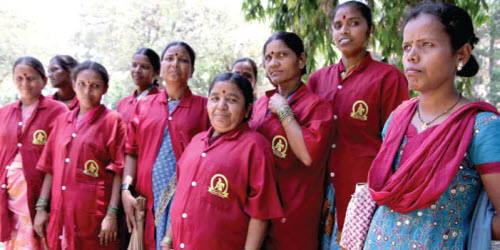
By Virali Gokaldas and the Global Alliance for Incinerator Alternatives
“Environmental Possibilities: Zero Waste” features new ways of thinking, acting, and shaping government policy that are circling the globe. Each week, we highlight a success story in the zero waste movement, excerpted from a report by the Global Alliance for Incinerator Alternatives (GAIA). GAIA is a powerful worldwide alliance of more than 650 grassroots groups, non-governmental organizations, and individuals in over 90 countries. Their collective goal is a just, toxic-free world without incineration. Other Worlds is excited to promote the work of GAIA and the organized communities it works with, and hopes that the stories inspire you and others to begin moving your home, town or city, nation, and planet toward zero waste.
Mumbai’s rapid growth, high density, and sheer size present significant challenges for its waste management system. The enormous quantity of waste generated in the city makes large-scale, technologically driven “solutions” tempting. However, the opposite approach—a highly decentralized, people-powered model of waste management—has proven successful. Dry waste is separated out for recycling while organic waste, Mumbai’s largest and heaviest waste stream, is treated close to its source through composting pits and biogas. This approach has reduced the need for costly transportation and landfill space while providing green jobs for waste pickers.
The Indian Municipal Solid Waste Rules of 2000 require source separation of waste and prohibit landfilling of biodegradable waste, but there is no formal recycling or composting program in Mumbai. There is, however, a thriving informal recycling economy. A large percentage of dry recyclables—meaning paper, plastic, metals, and glass—are recycled by waste pickers. This recycling sector is considered to be ‘informal’ since it is not regulated by government agencies, and there are no rules for pricing recyclable materials or protections for the health and safety of the waste pickers.
Because poor, low-caste women comprise 85 percent of the waste picker population, Stree Mukti Sanghatana (SMS), a non-governmental organization, started the Parisar Vikas (PV) program to train informal recyclers as “parisar bhaginis,” or “neighborhood sisters.” The bhaginis are taught the principles of zero waste, how to sort and handle waste from multi-family dwellings, composting and biogas plant management, gardening, and how to organize as worker cooperatives and negotiate contracts.
Through SMS programs, a total of 600 women work in almost 150 locations in Mumbai, ranging from institutional campuses to housing apartments. They bundle the dry, recyclable waste for sale to industry recyclers. Residuals and organics are either picked up by the city for disposal at dumpsites, or by SMS to be processed in composting and biogas facilities that produce manure and biogas for industry and domestic end uses.
Bhaginis earn income from the sale of recyclables and sometimes also receive a service fee for collecting, sorting, or managing composting pits/biogas plants. Most earn US $2 – $3 per day from collection fees and sale of recyclables, though this can vary considerably. Some apartments pay the waste pickers directly; others pay the co-op.
The cooperatives enter into recycling contracts with institutions, apartment complexes, businesses, and the municipality. They have seen the greatest success with private institutions and campuses, such as the Tata Institute for Social Sciences. At the institute, a cooperative operates a snack bar, sorting operation, and biogas facility. The snack bar generates 25 – 30 kg of clean, source-separated, organic waste per day. Supplemented with outside sources, this feeds the 100 kg/day capacity biogas plant. Gas from the plant meets a quarter of the canteen’s cooking gas needs. The operation has been so successful that the institute added another 500 kg/day plant at its larger canteen, and is constructing a third plant to service their new 1,000-student hostel.
Current contracts between the collector (SMS or the cooperative) and their customers are short, basic letters of agreement that allow bhaginis to come on-site to take dry recyclables away or to manage an operation for a set fee. The letters are typically signed and renewed on an annual basis and detail the number of bhaginis to be on site and the fee to be paid. Additional provisions include the necessity of safety and protection equipment, the need for identity cards to allow ease of access, and a requirement for worked hours to be documented.
Next page: the role of biogas plants in the Parisar Vikas program.

Rinkesh
I live near Mumbai but never heard of anything like that. No doubt, a great initiative towards clean and green environment. Thanks for posting this.
Henry
That’s very encouraging. I like the idea of treating organic waste with biogas digesters because that is one of the routes to a pollution-free world. The concept is really a good business idea – partnering with businesses to supply you with sorted waste.